President Rebecca Stoltzfus reappointed for a third term. Learn more
Explore the story of Harold S. Bender and his journey with Lasting Ties to academic research at Goshen College in 1924.
President Rebecca Stoltzfus reappointed for a third term. Learn more
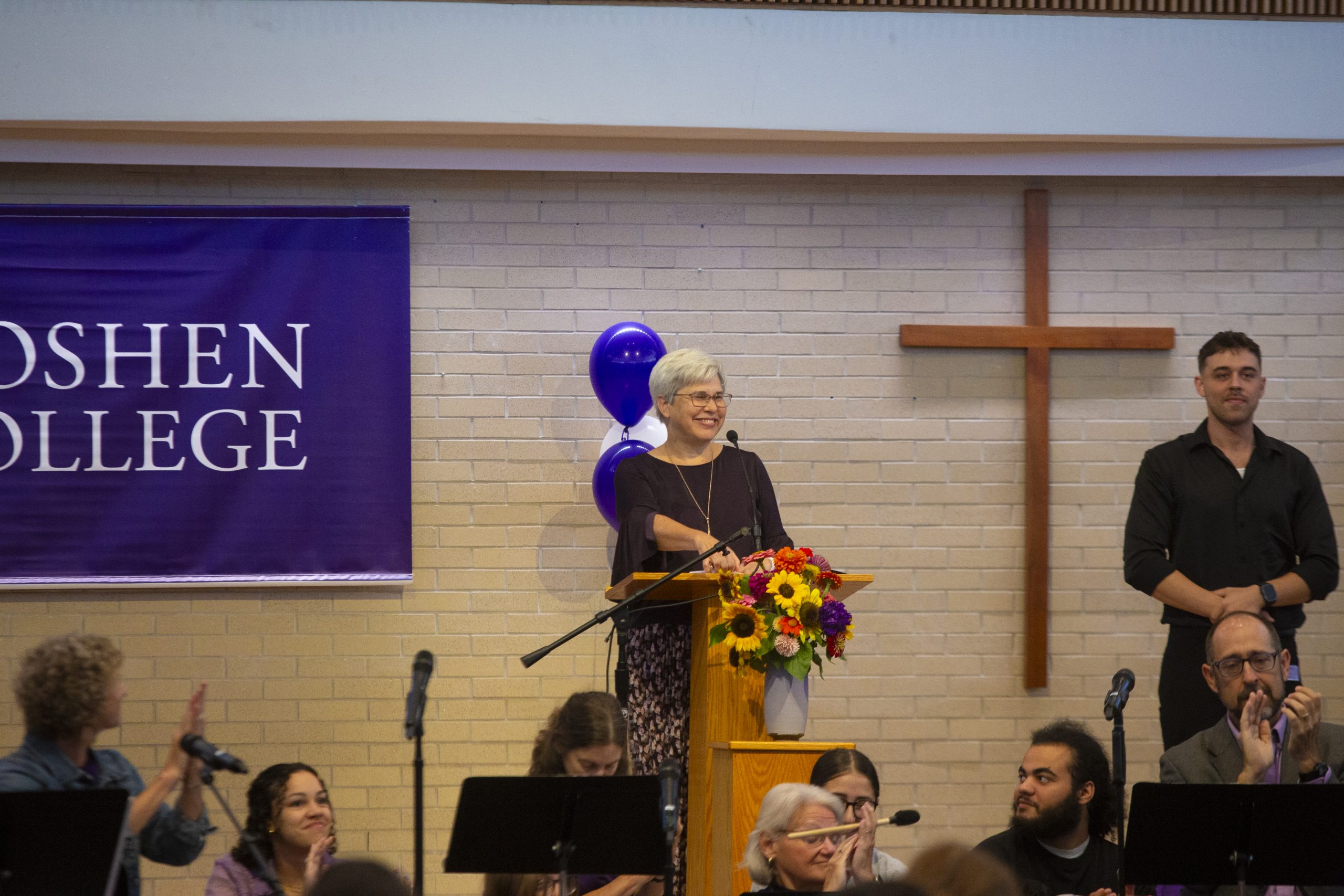
News
Aug 28 2025
President Rebecca Stoltzfus gave this welcome address on August 27, 2025, in the first convocation of the 2025-26 academic year.
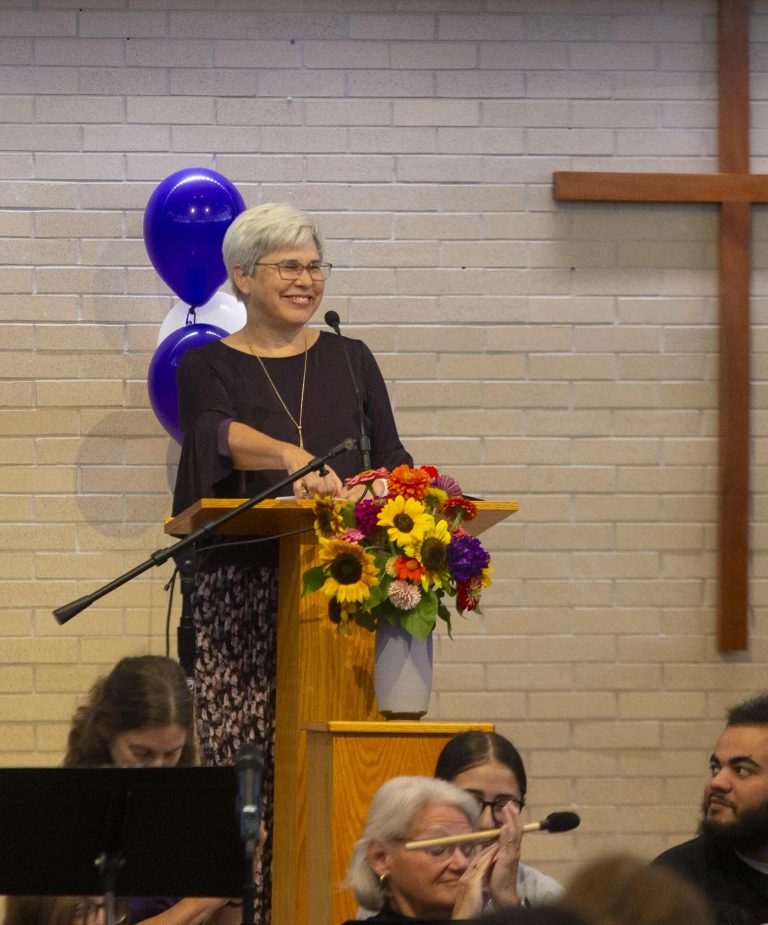
Welcome to the start of a new year at Goshen College!
500 years ago, way back in 1525, students and scholars in European centers of learning began to translate the Bible from Latin and Greek into their native languages. As they translated the gospels, the books of the Bible about Jesus, the stories about Jesus’s life and teachings transformed and empowered them, and through them it changed the world and its structures. This period, known as the Reformation, gave rise to many new faith traditions, including the Anabaptist Mennonite tradition. Goshen College is one of the many outcomes of that movement!
Earlier this summer, in May, I joined more than 3,000 people from around the world in Zurich, Switzerland, for the 500th anniversary of the Reformation and the Anabaptist-Mennonite movement.
I have asked our music team to share with us a song written by a group of Swiss Mennonite young people that was performed in Zurich as part of the anniversary celebration. It is mostly in English, but the first verse is sung in French. The words mean:
It is time to stand up again and look to the future with hope;
to turn to each other, and to refuse the sword where there are enemies,
Set out on the road, take the blessing with you, wherever you go;
stand up for peace!
This week, we begin a new academic year on a campus that enjoys abundant freedoms. A Goshen education is a liberal arts education – liberal meaning liberating. The purpose of a Goshen education is to give you the skills to live a life of freedom. Economic freedom, freedom from violence, freedom from fear and small-mindedness. Freedom from boxes that society might have put you in.
We want you to have the freedom to explore ideas and disciplines, freedom to discover the world and each other. And most of all, the freedom to realize your own particular powers of intellect and creativity and service to the world.
We want you to enjoy the freedom that can only be experienced in a community that treats you with dignity, even when you are flawed, which we all are, and make mistakes, which we all do.
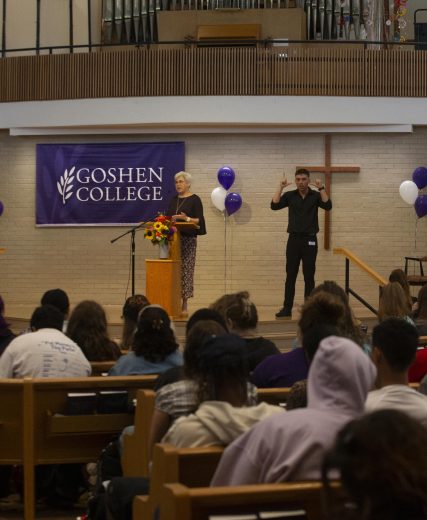
The human longing for justice, peace and freedom has never been perfectly realized. But this is what we are made for, and also what God wants for us: freedom that is inner, outer, personal, economic, structural, and spiritual.
Every year, a new community gathers for opening convocation. Every year this community strives to create freedom and dignity for one another in a world that does not create freedom and dignity for everyone.
We also strive to create peace in a world where violence is not only normalized, it is often idealized. We live in a world in which millions of people are moving across borders searching for peace.
Goshen College is rooted in a Biblical faith tradition that welcomes strangers and immigrants. We remember that the children of Abraham lived in exile and wandered through the wilderness. We remember that Jesus’s family were refugees in Egypt. We remember that many of our Goshen College community have crossed borders to get here. You are welcome here.
To every one of you gathering this fall, student or employee, bring your stories, personalities and cultures. I am so glad you are here. This is your campus! I want you to experience peace and freedom.
Now, while I have the privilege to stand here, making these claims, it is all of us together who create a campus that is liberating and creates dignity for each other.
Liberation and dignity require that we make room – living room, elbow room, room to breathe, room to grow.
How do we make room for ourselves and each other?
Some time ago, when I was living and working in upstate New York, I had a vivid dream that I was in my house and then discovered a new room that I did not know about. It was a good dream, and I awoke feeling energetic and disappointed that the dream had ended. I wanted that room! Ask me another time, and I’ll tell you how this dream reflected what was going on in my life. It eventually brought me back to Goshen College.
It turns out that a house is one of the most common symbols in dreams. In dreams, as in real life, houses reflect the person that they contain. The dream house is the space I occupy. Is it in need of renovation? Are its rooms cramped or spacious?
If our house is the space in which we dwell, then Goshen College is all about making room in your house.
There are rooms within you that you have not yet discovered.
Like Snoopy’s doghouse, you contain spaces that you have not yet imagined. My wish for you is that you continue to make room. Discover how expansive you can be. May your Goshen education liberate you from the cramped spaces that have constrained you.
How does this happen?
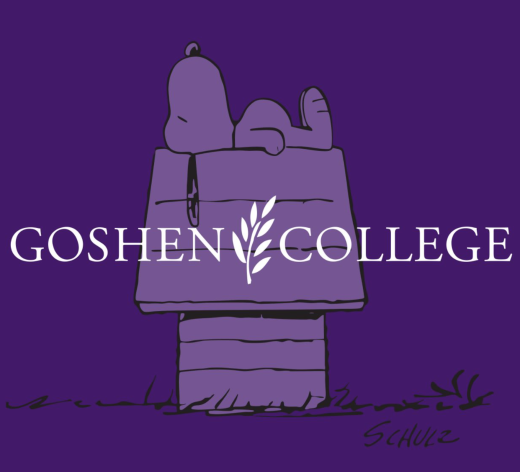 As you look around this convocation this morning, it is this community of fellow students, faculty, librarians, coaches, counselors and mentors who will make room with you and for you. Inside and outside of the classroom, in the spaces we share and create together.
As you look around this convocation this morning, it is this community of fellow students, faculty, librarians, coaches, counselors and mentors who will make room with you and for you. Inside and outside of the classroom, in the spaces we share and create together.
We may find interior peace, but dignity can only be achieved if we create it for one another. We may have a liberated mind, but justice happens between us.
We want justice, we want peace – in the world outside our amazing doghouses, not just inside them! And it is tempting to believe that there is a set of moral rules that will give us justice and peace. But relationship is even more foundational than moral rules. When Jesus was asked, teacher, you know the law and prophets. What is the greatest commandment? Which is the most important rule? Jesus said, love God and love each other.
And love doesn’t follow a strict set of rules. It is always a creative journey that puts relationships at the center.
This is not easy. People can be disappointing, annoying and sometimes downright scary.
Putting relationships at the center takes courage, creativity and compassion, but it is immensely rewarding. Social connection is the single most important predictor of a happy life. Your connectedness to people both here and beyond will be your shade when the world is hot, your water when your soul is thirsty, and your light when the world is dark.
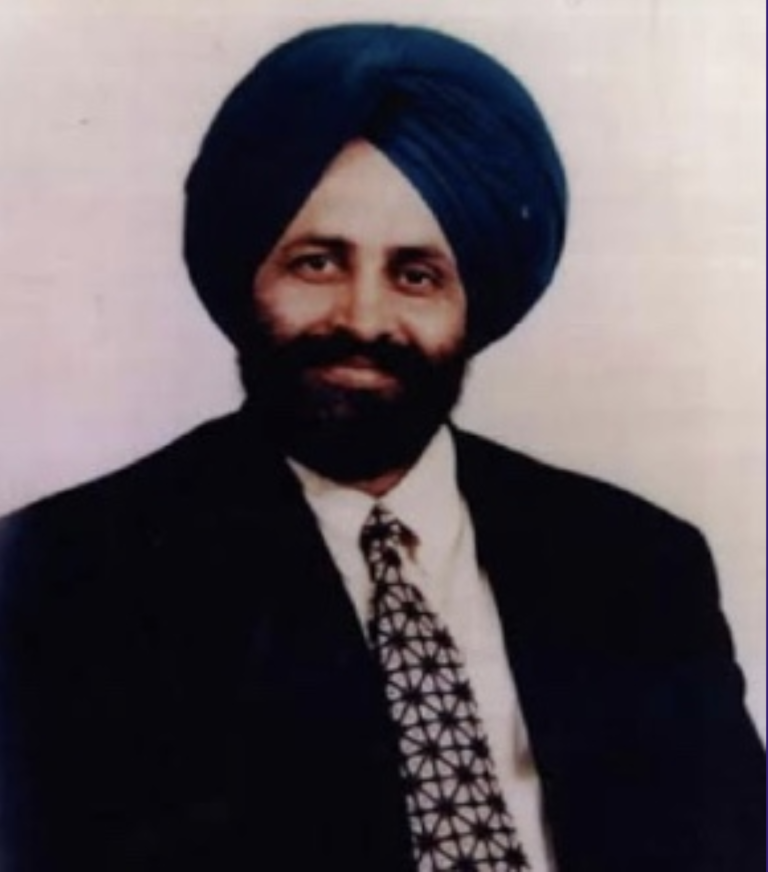
Balbir Singh Sodhi.
The first person killed in a hate crime after 9/11 was a gas station owner, Balbir Singh Sodhi, who was shot in the back on September 15 as he tended his store. Sodhi was a member of Valerie’s family. She changed her academic plans, and with the support of her senior thesis advisor, she began to document hate crimes against Sikhs and Muslims in America.
She writes in her book, See No Stranger,
“In the immediate aftermath of 9/11, in the thick of mourning and the heat of nationalist fervor, my cousin and I drove across America from city to city, sleeping on couches, following news of hate crimes as they popped up in our inboxes, taking trains and planes to get to crime scenes faster.
We caught the stories like shards of a mirror, each reflecting a fragment of the truth.”
After graduating, she used these stories to create the award-winning documentary film Divided We Fall: Americans in the Aftermath.
In writing about this period she said, “I was learning how to grieve with people and be present to their stories.”
It is a tremendous gift to learn how to be present with people, to truly listen. To do this when you are feeling angry and vulnerable is a real feat. It goes against our grain.
Human beings under threat are conditioned to draw close to those we already see as part of our own group. And we have an inbuilt instinct to respond by excluding and attacking those we see as “other.” We need to go to our safe rooms when we are under threat. But in that moment of regrouping, we have choices.
This is where we need to learn to go against our grain. To quote Valerie Kaur, to look at those outside our safe room and say, “You are a part of me that I have not yet met.”
Exclusion happens in physical ways — in the extreme, through violence — but exclusion happens much more commonly in subtle ways. We claim freedom for ourselves but fall into the tyranny of defining other people in ways that are convenient for us.
When we don’t really see people, when we focus only on what we choose to acknowledge in others, we impose a form of control on them. We box them in. To be truly present to each other is the opposite of this, it is to make room for the other in a way that grants them dignity, and allows for mutual discovery.
Right relationship is what we all long for. It is not sameness, or equality in a strict sense. It is a way of relating in which we allow one another the room to be – as they wish, not in ways that we impose on them.
Quoting Kaur again: “Right relationship is knowing that we are interconnected and seeking a form of connection that allows us peace.”
In our lifetimes, we will not experience full reconciliation with all people, but a big part of a Goshen education is to gain the capacity to live in peace with one another, now, before all is reconciled.
Valerie Kaur’s undergraduate research led her to become a documentary filmmaker, civil rights lawyer, interfaith leader, author, and renowned speaker.
I am thrilled to share the news that Valerie Kaur will be coming to Goshen College next month through the Atlee and Winifred Beechy Peace Lectureship on September 19. She’s a very gifted speaker with a powerful voice for our time. I hope you come to hear more of her story.
And now, it is our opening convo tradition to announce the three 2025 winners of the Global Citizenship Award. They are rising seniors who represent our Core Values in courageous, creative and compassionate ways.
These awards are made possible by Dr. Shashi Buluswar. Shashi came to Goshen College as a student from Calcutta, India, and now teaches at UC Berkeley, working toward solutions for combating global poverty.
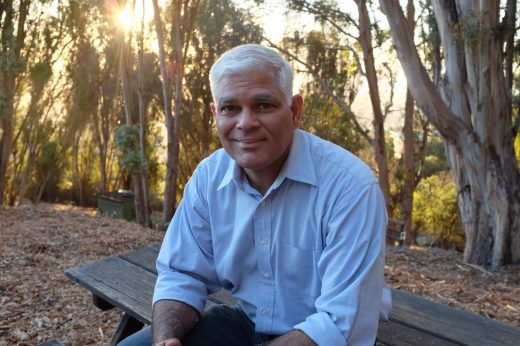
Shashi Buluswar
As Shashi explains: “…now more than ever in recent memory, the world needs a new generation of leaders who can think big, act boldly, and bring about positive systemic change with courage, kindness and humility. The recipients of the Global Citizenship award have shown remarkable potential to become exactly such leaders and change-makers.”
Students were nominated for this award by faculty and wrote an application essay. This is a highly selective award, and I want to commend every student who was nominated.
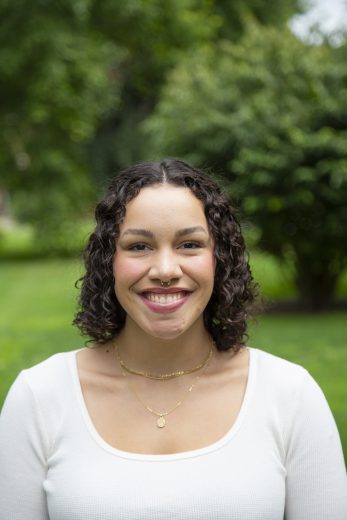 Aysia is known for her powerful, expressive singing voice, in the chapel singing team, Parables, Voices of the Earth, Chamber Choir, Queen Singers, and her roles on the Mainstage.
Aysia is known for her powerful, expressive singing voice, in the chapel singing team, Parables, Voices of the Earth, Chamber Choir, Queen Singers, and her roles on the Mainstage.
Through singing, Aysia connected with a deeper meaning behind the music. This openness freed her to follow her faith journey to activism, community building, and working for justice. Aysia chooses courses and experiences that challenge her, like the Inside Out program in the Elkhart County Jail. She wrote, “Learning alongside each other with open minds, hearts, and compassion built meaningful connections that are the foundations for peacemaking.” Aysia has learned that servant leadership is about love, new relationships with people who are different from you, and dreaming of an interconnected world.
Congratulations, Aysia!
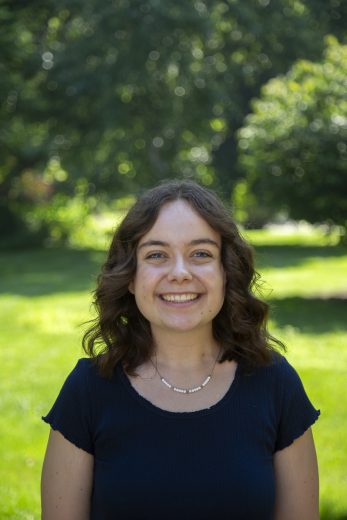 Lindsey strives to be a “Christ-centered vessel for love through leadership and service.” And she has found plenty of meaningful ways to do just that, as a Peer Wellness Educator, a member of the Goshen Monologues Committee, a Features Editor for the Record, a participant in the Peace Oratorical Contest, the Prevention Intervention Network and New Student Orientation. A Goshen study-service term took her to Northern Ireland to learn about the Troubles between Catholics and Protestants and the tangible power of communities praying and working towards peace and reconciliation. Lindsey has chosen a legal career to advocate for restorative practices and healing, both in individuals and in communities.
Lindsey strives to be a “Christ-centered vessel for love through leadership and service.” And she has found plenty of meaningful ways to do just that, as a Peer Wellness Educator, a member of the Goshen Monologues Committee, a Features Editor for the Record, a participant in the Peace Oratorical Contest, the Prevention Intervention Network and New Student Orientation. A Goshen study-service term took her to Northern Ireland to learn about the Troubles between Catholics and Protestants and the tangible power of communities praying and working towards peace and reconciliation. Lindsey has chosen a legal career to advocate for restorative practices and healing, both in individuals and in communities.
Congratulations, Lindsey!
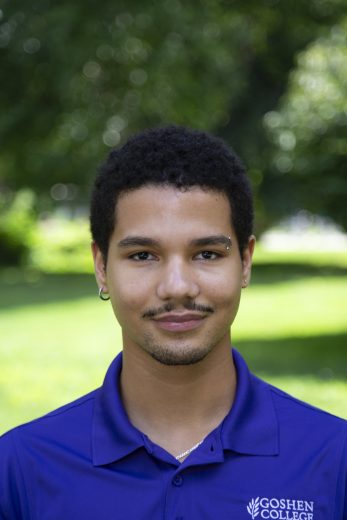 When someone needs help, Fernando is well-known to say, “I can do that!”
When someone needs help, Fernando is well-known to say, “I can do that!”
Fernando is motivated by what he calls a “restless passion.” As a first year student he changed his major three or four times because he was curious and passionate about everything. He eventually landed in Business and also Peace, Justice and Conflict Studies. His co-curricular activities are too many to list, but include being a Peer Financial Coach with Everence, a two-time Maple Scholar, a volunteer at the Center for Healing & Hope, the Prevention Intervention Network, and he is the longest-serving leader of the Latino Student Union.
Fernando, along with other GC students, participated in a recent United Nations Seminar in New York City. He came away inspired about the power of nonviolence and conflict resolution “as a daily practice that promotes justice and creates safer spaces.”
Congratulations, Fernando!
As we begin this year, may you make room within yourself for peace and freedom. I pray you have the power to use your amazing spaces as a refuge that offers you energy to create justice in the world.